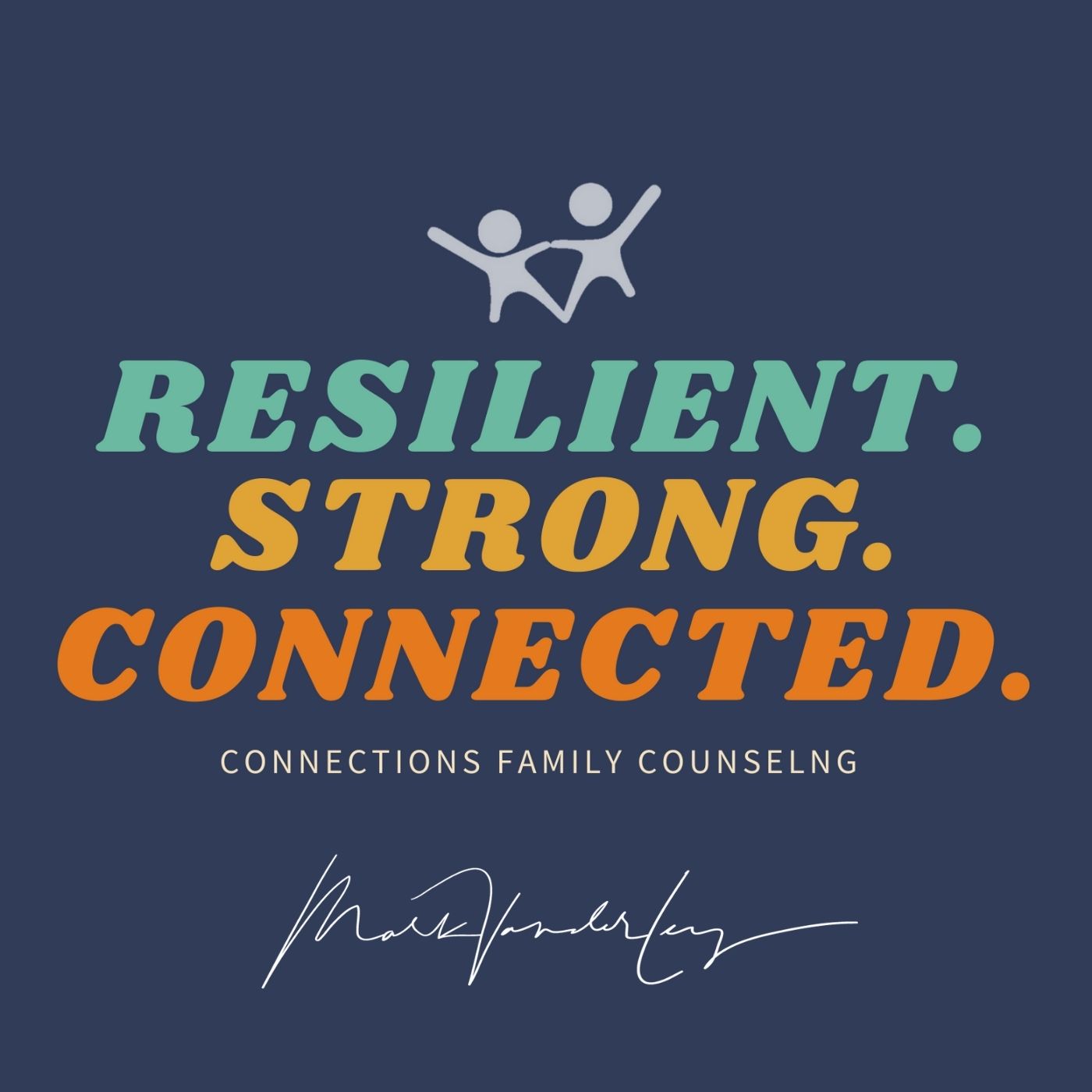
11.4K
Downloads
48
Episodes
Dr. Mark Vander Ley and his guests discuss topics relevant for parents that desire to build a deep connection with their children and loved ones.
Dr. Mark Vander Ley and his guests discuss topics relevant for parents that desire to build a deep connection with their children and loved ones.
Episodes
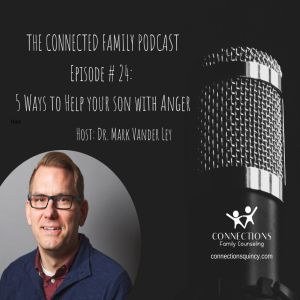
Sunday Aug 23, 2020
Five Ways to Help Your Son with Anger
Sunday Aug 23, 2020
Sunday Aug 23, 2020
Validate his feelings
Anger is a very powerful emotion. Many times anger is expressed on the outside when on the inside he is feeling sadness. Acknowledging your sons anger helps him to feel heard and can actually decrease the intensity of its expression. When you say, “you are really angry about this” it communicates to your son that you understand him therefore he can decrease the expression of the anger because you recognize it.
Listen without judgment
Validating feelings begins by listening and seeking to understand his perspective without judgment. The temptation is to correct misperceptions or misunderstandings however this is not helpful. Correcting perceptual mistakes only communicates that you don’t understand HIS perspective. When your son realizes that you “get it” from his perspective the anger will decrease and you become an ally in the problem solving process. When you are his ally in problem solving you can ask questions that provoke thought and reflection encouraging him to find conclusions and solutions to his own problems.
Give YOURSELF a Timeout
Sometimes the hardest thing about having a son that expresses lots of anger is managing your feelings in the moment. Sons can say hurtful things, your fears may be triggered, or you may be afraid for your family’s safety. In this situation, give YOURSELF a timeout. The issue does not have to be resolved right now, give your son some space (as long as everyone is safe) this space allows for all parties to calm down, think things through and make better decisions. After sufficient time has passed reconnect with your son, apologize for any mistakes you made and start over by using suggestions 1 and 2 from this list.
Practice Self-regulation
Large expressions of anger are a clue to you about how “powerfully” your son is feeling his anger. Sometimes, he will have a difficult time calming down, or keeping his “bottle from bursting”. These times of feeling out of control are normal for a boy that is still learning to self-regulate. You can help him to learn to self-regulate by modeling calmness, using controlled breathing, and practicing mindfulness.
Set Limits
One of the major challenges parents encounter in the face of their sons anger is maintaining family limits when things get really heated. It is important that you calmly, and consistently set limits on behavior in the home. These calm and consistent limits allow your son to know “how far he can go” in expressing himself. He will push up against them and test them but when you calmly maintain the expectation it feels safe and comforting to him. Sometimes, these limits are broken in such cases it is important to refer to suggestion 3 and give YOURSELF a time out before calmly talking to your son about what will happen next. Giving time for all parties to calm down is a very helpful thing.
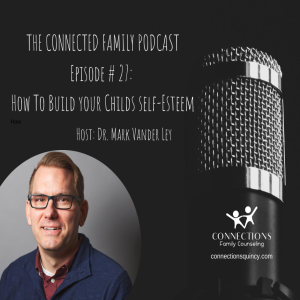
Monday Aug 17, 2020
How To Build Your Child's Self-Esteem
Monday Aug 17, 2020
Monday Aug 17, 2020
Self-esteem is a concept that is regularly discussed in our current culture. Many parents fill their child’s life with activities, play dates, and positive affirmations in the hopes of creating greater “self-esteem”. In many cases however, it does not seem to work. The harder we work to build our kids up the lower their self-regard. This post is intended to give you a framework for how to build your child’s self-esteem.
What is Self-esteem?
Self-esteem is made up of a child’s academic and non-academic self-concept, that is, how the child views himself in those two domains. Each domain is broken down further into more specific areas. Academic self-concept is divided into the subjects of math, science, english, and social studies. Non-academic self-esteem includes the areas of social, emotional, and physical self-concepts. Global self-esteem is a combination of how the child experiences himself in these areas combined.
What makes Self-esteem?
So we know what self-esteem is but what makes one child have more than another. Researchers have found
“The greater the discrepancy between adequacy in some domain and importance of that domain, the greater the negative impact on self-esteem” (Broderick & Blewitt, 2015).
In other words Self-esteem is made when a child experiences success in a domain that is highly important to them.
How to build Self-esteem?
The role of parents then, is to discover which domain is most important to their child and to support it. Does your child love math but hate soccer? Then, practicing soccer with them may not be the most important thing on the list. You may want to spend more time doing math together and joining them in that love. Discover what is important to your child and support them in that area.
Support from parents is a key way to build self-esteem and so is competence. When a child feels competent in an area that is important to them, their self-esteem is enhanced. So, focus on providing lessons, activities, and competence building experiences in the areas that are important to your child. As they build competence in these areas they will grow in confidence. If we focus too much energy on too many areas the child may be overwhelmed and tired.

Monday Aug 10, 2020
How Pornography Hurts Your Son
Monday Aug 10, 2020
Monday Aug 10, 2020
I was watching my son’s baseball game the other day and happened to overhear an exchange between two parents and their two sons that compelled me to write this post.
The two boys were joking and laughing with one another through out the game. One of the boys joked with his mother sitting near by and goaded her to ask the other boy why he had been grounded from his smart phone. The second boys father walked up and jokingly gave the reason by saying, “somebody likes the P-O-R-N a little too much”. The father, his son, and the other boy laughed and continued on with their activities.
I, on the other hand began to think through some of what I had been learning from the book Wired for intimacy: How pornography hijacks the male brain written by William M. Struthers. I missed my opportunity to share with this father how pornography hurts his son. But, will share with you now what I have learned about the impact of pornography on boys.
Pornography Corrupts Intimacy
We all, boys included have a built in need for connection with other people. We are driven to seek relationship, closeness and safety with those we love. Pornography corrupts this desire by making intimacy all about the physical act of sex rather than vulnerability, and emotional connection. Struthers states it this way,
“pornography corrupts the ability to be intimate. It pulls consumers and producers in with the promise of intimacy, but fails to deliver the connection between two human beings”.
Sex is a part of deep intimacy but it is not the whole picture. Pornography promises the connection that boys long for but delivers shame, guilt, secrecy and pain.
Pornography Consumes the Brain
New brain research demonstrates that experience changes the brain. The viewing of pornography and the subsequent acting out is no different. The more pornography is consumed the greater the impact it has on the brain. Again Struthers describes it well by saying,
“As men [boys] fall deeper into the mental habit of fixating on these images, the exposure to them creates neural pathways. Like a path is created in the woods with each successive hiker, so do the neural paths set the course for the next time an erotic image is viewed… with each lingering stare, pornography deepens a Grand Canyon-like gorge in the brain through which images of women are destined to flow”.
The more pornography that is consumed and the younger the age of exposure the more significant the impact will be on the brain.
Thankfully brain research also demonstrates that the brain is plastic. This means that it changes through out the entire course of ones life. So, the neuro-pathways developed in response to viewing pornography can be rewritten over the course of life. So what can you do to help your son?
What Can Parents Do?
Build Emotional Mastery
For those dealing with porn addiction the viewing of pornography and sexual acting out often become the primary way they deal with stress and overwhelming emotions. They never learned how to adaptively regulate emotions and pornography has become the only strategy that works.
“emotional mastery is important because it teaches boys how to regulate and control their feelings. As a father pushes and challenges, he offers an opportunity for his son to experience these human emotions in a safe place.” (pg. 141)
Connect in Relationship
As stated before we all need connection to other people for survival. Struthers says that the depth of porn addiction is correlated with a boys unmet emotional and relational needs. If you are concerned that your son is addicted to porn it may be tempting to avoid discussing it or to distance yourself from him in anger. What he needs however is more connection with you. His needs for connection and intimacy will never be met through pornography. Those needs are only met in genuine connection with you or other loved ones. Move toward your son in relationship communicate compassion and love in the midst of your heart break.
Get Help
It can be difficult to reach out for help when struggling with pornography. Our culture tends to view porn addiction as one of the things that cannot be talked about. Reach out to trusted friends, a pastor of professional counselor to walk with you and your son through the struggle.
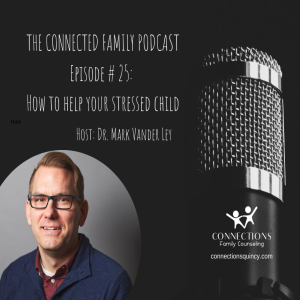
Monday Aug 03, 2020
How to Help Your Child Learn to Manage Stress
Monday Aug 03, 2020
Monday Aug 03, 2020
Our children live in a culture full of stress. There is pressure to be involved, pressure to be the best, and pressure to fit in. Some claim that the current generation is exposed to more stress than any previous generation.
Psychologists define stress as “the demand made on an organism to adapt, cope, or adjust.”
When we think about stress in this we it is easy to see that since we live in an ever-changing world and culture the ability to adapt at a young age may be more important than ever.
Psychologists also acknowledge that not all stress is bad and actually claim that some stress (Eustress) is good. Eustress is the type of stress that propels one forward to accomplish the next stage of development or to learn a new and exciting skill. Eustress can be exciting and motivating where as stress can be overwhelming, debilitating and pervasive. So what can be done to help a child that is experiencing the negative type of stress? Researchers have discovered a number of things that when practiced on consistent basis moderate the level of stress that one is experiencing. That is these things help to reduce the negative impacts of ongoing stressful situations.
Self-efficacy expectations: when one believes that they can, they can. We can instill in our children a sense of “you can do it”. This can be done by supporting them through the learning and development of a new skill of hobby. (Check out this post on Self esteem to learn more)
Psychological Hardiness: Hardiness is comprised of the characteristics of commitment, challenge and control. According to research people who are strongly committed to their activities, view challenges as a part of life to spur personal growth, and those that believe they have control over their lives were more hardy and resistant to stress.
Humor: Researchers found truth in the biblical saying “A merry heart doeth good like a medicine” Proverbs 17:22. One study found that those with an ability to see humor in stressful situation were less impacted by that stressful situation.
Emotional support: Research has also found that support from trusted family members and friends, decreases the level of stress and depression that people report experiencing in the last month.
So what can you do?
Believe in your child so they can believe in themselves. Provided unique challenges for them and support them in accomplishing them to build that sense of “I can do it”. Encourage your child to see challenges as opportunities for growth, view them as that way for yourself and your family. Laugh at yourself, keep a light heart, and share the connection of humor. Lastly, be there with a listening ear and word of encouragement when the road gets tough. They may act like they don’t need you but we all need the support of our family and friends.
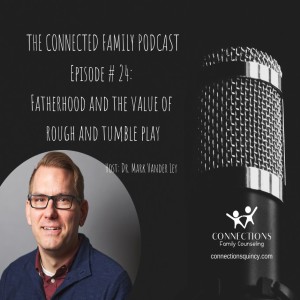
Sunday Feb 23, 2020
Fatherhood and The Value of Rough and Tumble Play
Sunday Feb 23, 2020
Sunday Feb 23, 2020
Dr. Mark Vander Ley Discusses Fatherhood, Attachment theory, and the value of rough and tumble play
on this episode Dr. Vander Ley will discuss:
1.Historical and religious motifs of fatherhood
Moral teacher guide
Distant breadwinner
New nurturant father
2. Father as a picture of Gods’ grace
3. Fathers through an attachment lens
Mother-child attachment relationship compared to the Father-child activation relationship
Different but complementary ways of building parent-child attachment
Fathers often spend more time in play than caretaking
4. The role of physical play is important
Challenge in the context of safety
Rough and tumble play
Mutual enjoyment of physical play
Competition skills-how to handle conflict in socially acceptable way
I LOVE YOU. I am Stronger than you
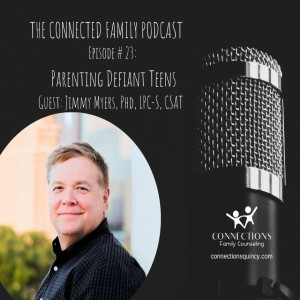
Sunday Jan 26, 2020
Parenting a Defiant Teen With Jimmy Myers, Ph.D., LPC-S, CSAT
Sunday Jan 26, 2020
Sunday Jan 26, 2020
Dr. Mark Vander Ley and Dr. Jimmy Myers discuss the second edition of Jimmy's book "Toe to Toe With Your Teen: A Guide to Successfully Parenting A Defiant Teen Without Giving Up or Giving In." Mark and Jimmy discuss the importance of maintaining a strong relationship with your teen when setting limits. Jimmy utilizes an acronym and recommends riding the peace TRAIN for relationship building. He tells parents to focus on Time, Reducing Negativity, Acting against stereotype, taking an Interest in the teens world, and that Not every moment is a teachable moment. Jimmy also challenges parents to parent their teens the way God has parented them. He describes God as a parent that is loving, forgiving, accepting, holy, just and sovereign. Mark and Jimmy then discuss the challenge that many parents face in managing their own anger in conflict with a defiant teen. Jimmy explains why this can be so difficult and how a parent can navigate when they are triggered
Dr. Jimmy Myers is the visionary Founder, Owner, and Chief Executive Officer of The Timothy Center, located in Austin, Texas. The Timothy Center, opened in 2001, is a unique, multi-campus counseling practice that focuses on helping adolescents and families find God’s solutions to life’s challenges. The Timothy Center also provides secure online counseling throughout the state of Texas and consultation services nationwide. As a full time, licensed professional counselor/supervisor, Dr. Myers has also served as Family Pastor at LifeAustin (lifeaustin.com) – and has served over 20 years on staff at two large Southern Baptist Churches. In the many years of ministry to teens and their families, Dr. Myers’ experience has shown him that it is never too late to turn a family around. Dr. Myers has spent more than 30 years writing, ministering, and speaking nationwide about mental health issues, sexual addiction, teenage life, and Christian family
- Fearless Parenting: How to Raise Faithful Kids in a Secular Culture, (2017) Co-authored with George Barna, Baker Books
- Pairadocs Podcast, a weekly podcast with a Christian take on life, family, and culture. (pairadocspodcast.com)
Join The Connected Family Facebook Group
Connections Family Counseling on Instagram
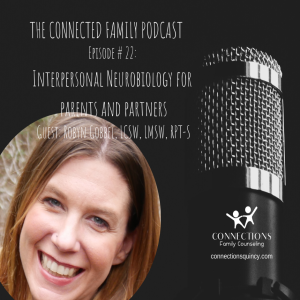
Sunday Jan 19, 2020
Sunday Jan 19, 2020
Dr. Mark Vander Ley and Robyn Gobbel, LCSW, LMSW, RPT-S Discuss the basic concepts of Interpersonal Neurobiology for Parents and Partners. Robyn offers an overview of the important concepts as well as implications in a variety of situations. We are challenged to look beyond behaviors and understand what is happening on the inside of our family members.
Robyn Gobbel, LCSW, LMSW, RPT-S has over 15 years of practice in family and play therapy experience, specializing in complex trauma, attachment, and adoption. Robyn is a therapist, trainer, and consultant who recently relocated to Grand Rapids, MI from Austin, TX. Robyn’s diverse clinical training includes EMDR (including EMDR adapted for children with attachment trauma), Somatic Experiencing, Theraplay, Trust Based Relational Intervention®, Circle of Security Parent Educator, The Alert Program® and Yogapeutics Aerial Yoga Level 1 Teacher Training. Robyn has integrated these training modalities with a foundation of attachment theory and the relational neurosciences to create an attachment-rich, sensory-sensitive, and relational neurosciences supported healing environment for children and families. Robyn consults, teaches, and trains extensively throughout the US, including as an instructor for the Foundations of Interpersonal Neurobiology Certificate Program at Portland Community College and with the Adoptive & Foster Family Therapy Post-Graduate Certificate Program offered by Portland State University and Oregon’s Department of Human Services. She has recently joined the working board of the Global Association for Interpersonal Neurobiology Studies (GAINS).
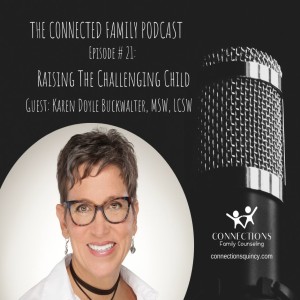
Sunday Dec 29, 2019
Raising The Challenging Child with Karen Doyle Buckwalter, MSW, LCSW
Sunday Dec 29, 2019
Sunday Dec 29, 2019
Dr. Mark Vander Ley and Karen Doyle Buckwalter, MSW, LCSW discuss the new book "Raising the Challenging Child". The book harnesses Karen's 25 years of experience serving children with attachment disorders and complex trauma. Mark and Karen discuss the tried and true strategies outlined in the book that will help parents minimize meltdowns, reduce conflict, and increase cooperation.
Karen has more than 30 years of experience working with children, adolescents and families, the last 25 of which she has been at Chaddock. She has co-authored journal articles and book chapters as well as articles which have appeared in Adoption Today and Fostering Families Today Magazines. Her first book, Attachment Theory in Action, edited with Debbie Reed was released in 2017 and she also hosts the Attachment theory In Action podcast. Her second book co-authored with Debbie Reed and Wendy Lyons Sunshine, Raising the Challenging Child published by Baker Books, will release in January 2020. Outside of work you will find her hiking the Blue Ridge Mountains of the Carolinas.
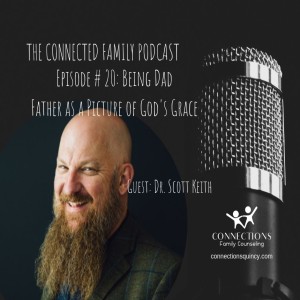
Sunday May 26, 2019
Being Dad: Father as a Picture of God's Grace with Dr. Scott Keith
Sunday May 26, 2019
Sunday May 26, 2019
Dr. Mark Vander Ley speaks with Dr. Scott Keith about his book Being Dad: Father as a Picture of God's Grace. In this episode Dr. Keith explains the connection between the story of the prodigal son and fatherhood. He describes fatherhood as a shadowy representation of God's grace and explains how fathers can point their children to salvation through Christ.
Dr. Scott Keith is the Executive Director of 1517 and adjunct professor of Theology at Concordia University, Irvine. He earned his doctorate from Foundation House Oxford, under the sponsorship of the Graduate Theological Foundation, studying under Dr. James A. Nestingen. Dr. Keith’s research focused on the doctrine of good works in the writings of Philip Melanchthon. He is a co-host of The Thinking Fellows podcast, contributor to 1517, Christ Hold Fast and The Jagged Word blogs, and author of Being Dad: Father as a Picture of God’s Grace. Dr. Keith resides in California with his wife, Joy and family, dividing his time between the mountains and the beach.
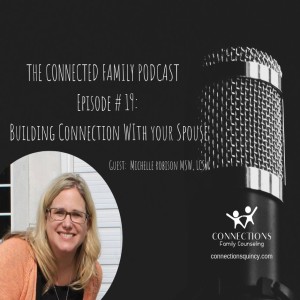
Tuesday May 21, 2019
Building Connection with Your Spouse
Tuesday May 21, 2019
Tuesday May 21, 2019
Dr. Mark Vander Ley and Michelle Robison, MSW, LCSW discuss the topic of "Building Connection with Your Spouse". Listeners will get an introduction to the work of renowned couples therapist Susan Johnson and an introduction to attachment patterns in the marriage relationships. Mark and Michelle discuss the patterns or "dance" that often develops between couples and how to recognize these patterns. They also discuss ways to handle conflict that draws you closer to your spouse as opposed to creating more distance.
Connections Family Counseling, LLC
